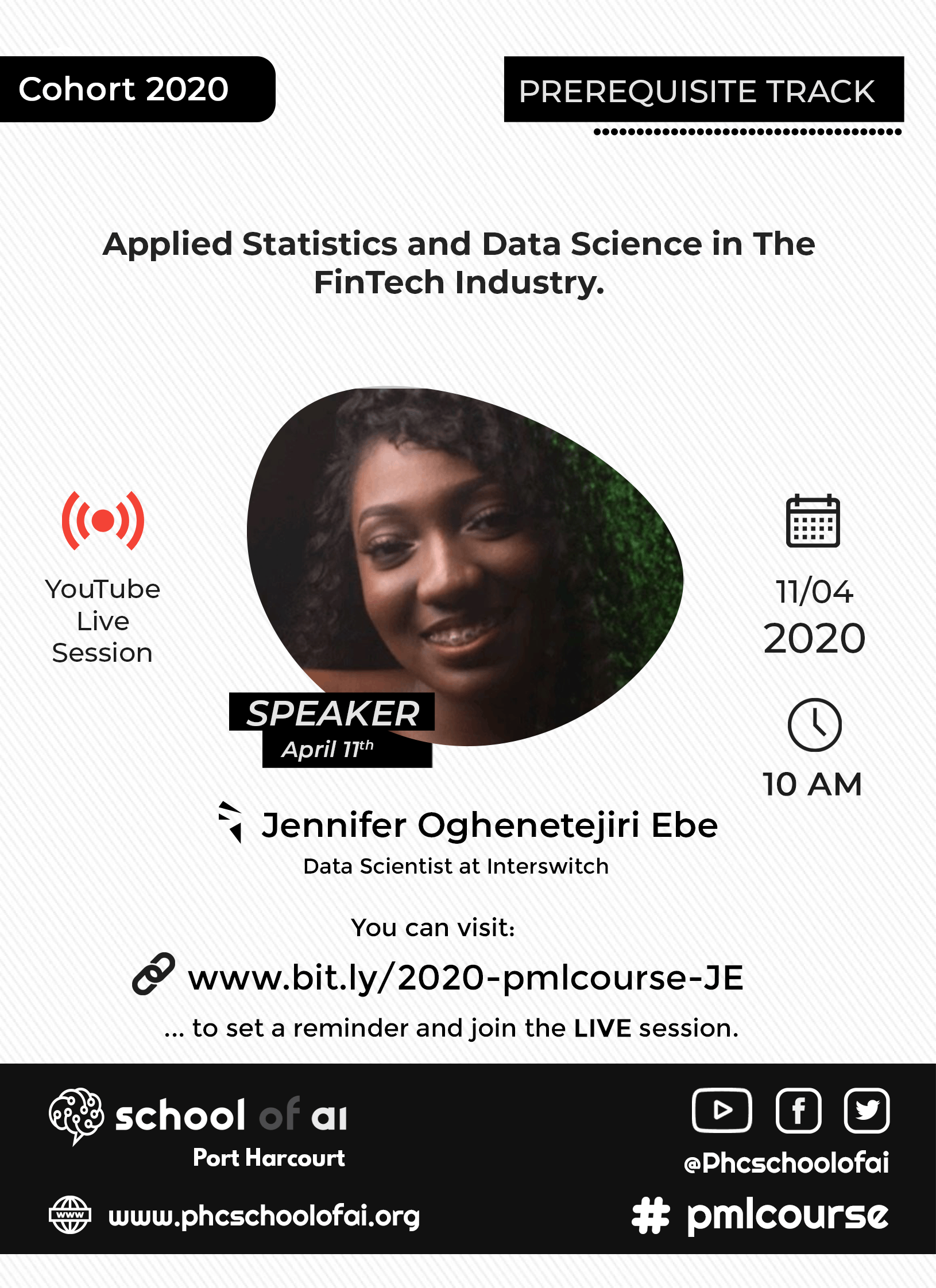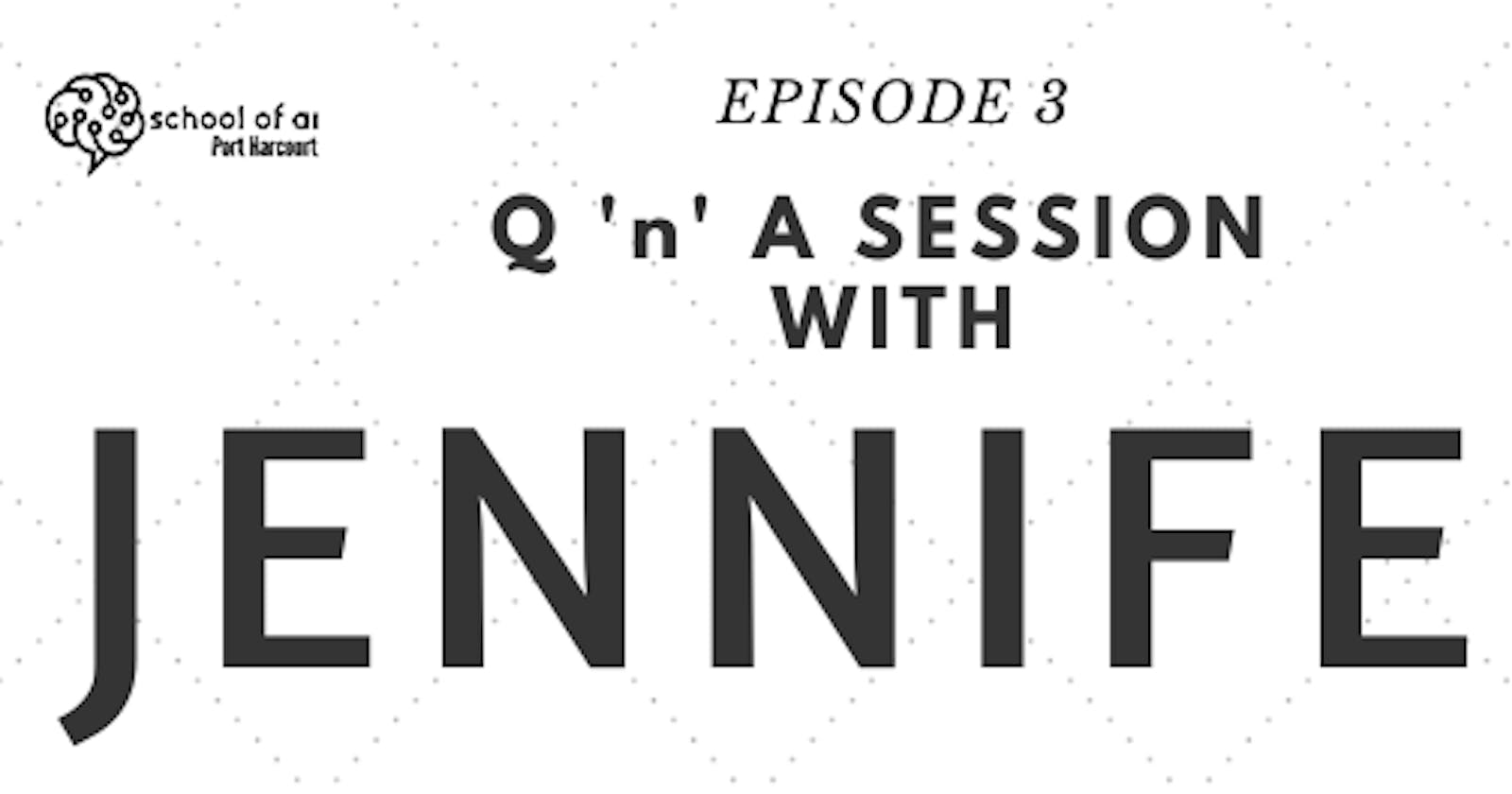Insights In AI and Data Science (Episode 3): Q and A with Jennifer Ebe, Data Scientist at Interswitch Group

Hello, community!
We are back to our "Q 'n' A With Our Experts" blog post series. You can check the previous blog post in this series on Exploratory Data Analysis (EDA) by clicking here.
In this episode, our interviewee is one of the guest facilitators for the Practical Machine Learning course from the Port Harcourt School of AI. This interview is intended to give an insight into the mind of Jennifer Ebe who is a data scientist at Interswitch. She applies data science and statistics to solve FinTech problems in her role. She is also one of the community volunteers at the Port Harcourt School of AI, and we are extremely delighted to have her in the community.
Through these interviews, we try to make sure the participants of the course get inside the mind of their guest facilitator and as well as the general community. Enjoy!
You can also follow Jennifer's live session (or recording thereof) with the Port Harcourt School of AI by clicking here.
There are 3 categories of questions, they can be found below. Since the article is also a bit lengthy, we also provide a break session so you can take your time to absorb the information or take the needed walk or squats that will aid your retaining of the information (not scroll through your Twitter feed! 😅).
If you want to jump through to a category quickly, you can click on any one of the categories below.
Applied Statistics and Data Science Questions
Personal questions
Stephen: Hi, Jennifer! Thanks for doing this Q ’n’ A session with us — we are honoured. Please can you introduce yourself?
Jennifer: My name is Jennifer Ebe... I think that's all you need to know yes? lol
Stephen: I already did a spoiler alert by stating your name, lol. Perhaps the readers will get to know you better through the next sets of questions. How did you get into your current field?
Jennifer: Well, I have always liked the idea of being able to predict what's going to happen in the next few years, months, days... Do you remember when we were little and excited about how meteorologists could predict rain and sunny days? Just like that only I thought I was going to predict when and where I could end up if I had the right data. So I guess you could say being a control freak brought me here.
Stephen: Oh wow! I could imagine you had such an exciting childhood. A pretty great way to get into the field of "magic, insight-deriving crystal gazing (AKA data science) :D". What did you want to be when you went to university? What did you end up studying? And how did what you studied impact how you currently work.
Jennifer: I think I always wanted to be an electrical engineer because I like the electric devices I was fascinated with taking them apart and figuring out how they work, then one day in SS2 I heard my maths teacher talk about statistics, I was fascinated! I decided I wanted to control my life, predict stocks and buy a huge chunk of stock that will earn me millions of naira lol. You see it was mostly selfish but I'm here now!
Thing is it wasn't exactly as I pictured... now I have access to lots of data and if I have learned anything is you do not know anything about data, it changes, it doesn't lie and you can twist it to almost fit any narrative just like the bible.
Stephen: If data science was a person and ever needed a hype-man, I'd definitely nominate you first, lol. But it's quite evident that even your curiosity was a core reason for you choosing this field. Exciting! What was your journey like from where you were all the way to Interswitch?
Jennifer: I started as a freelance data analyst using tools like SPPS, Power BI, Gretl just to name a few for my friends mostly, then I got introduced to a couple of people that wanted my contribution with projects then I guess everything pretty much too off! I've always known I wanted to work with data but in the Fintech or Health industry because I am passionate about these data. But the journey to Interswitch truly started when I started to put myself out there, research about companies that might need my skills and that aligned with where I was going... So I started to align myself by starting my transitioning -- taking courses, participating in challenges and basically just showing up after like 6 months I applied and yay! I got in and since then it's days of putting in lots of sweat and tears (lol, not to scare you), it is great! Challenging!
Your career is basically in your hand, you are always learning always on your toes but every moment is always enjoyable.
Stephen: Such an inspiring journey! Thanks for sharing that. You've seen that readers; your career is basically in your hands. We will now go for a brief break and as a reader, you can decide to take your eyes off the screen a little and reflect on what you have learned from Jennifer. We'd be back with a second set of questions in our next section "Applied Statistics and Data Science Questions".
(Optional) Take a brief break...
Applied Statistics and Data Science Questions
Stephen: Welcome back! Jennifer, pretend I’m new to the field of data science and data analysis. Can you explain how statistics and data science interleave in different fields?
Jennifer: There is a huge relationship, obviously, between statistics and data science. Statistics is very relevant, as an important part of data science but not the whole thing.
I think data science focuses on making predictions and optimization of large databases, while statistics is more focus on drawing conclusions from data, statistics is focused on mostly causation.
I actually think the difference in depth and tools, data science concrete is the practical application of statistics to real-world problems asking better questions.
Stephen: Really well put, and I sure think it'd seem apt to the readers as well. What have you learned about data science at the industry-level that you think is still not clear to other people?
Jennifer: First, off the most important thing I know right now about data is that there are no shortcuts! Data doesn't lie! and also I am beginning to understand you can twist it to fit almost any narrative.
Stephen: I'd agree with that too. It's really easy to lie with anything statistics-related and why I think we need to get the general public to be data-literate in some sense. Thanks for sharing.
Talking about the industry, in your opinion, how much mathematics and statistics do you think one needs to be proficient at so as to apply data science to solve real-world problems?
Jennifer: Honestly?
I think the most important thing you need to know or do is show up! obviously there's some gain to having a mathematics/statistics background you understand the underlying principles behind the mask but don't be deterred just show up day by day and learn.
Stephen: I think a common view we both share is the idea of learning and sometimes even over-doing it, and adding to that for the readers, don't just learn, learn intentionally (by learning how to learn) and learn from experts too, always (if you can). As a practitioner, it has helped me with my career growth and I would recommend it for your growth.
Back to you, Jennifer. What are the necessary skills to learn to be successful in data science at the industry-scale?
Jennifer: Be willing to learn, be inquisitive, listen and develop a root cause mindset.
Stephen: We should perhaps change the theme of this interview to "Learning", lol. Great take Jennifer and I love the unconventional approach of not stating specific tools or sub-fields to delve into; as a learning mindset should be the optimum pre-requisite and skill needed.
Talking about tools, what are your favourite data science tools?
Jennifer: I used to think I had favourites... if I did it will be Datasist by Boris and Rising because I love shortcuts, but now? I have no favourites I show up an learn whatever I need to be great at my job lol.
Stephen: Awesome! Although you have stated you love shortcuts, can you settle this debate; Python or R? And Why?
Jennifer: Python, of course!!! I told you I love shortcuts... it reads like English lol.
Stephen: Lmao, quite true. Although surprising, judging that your background (undergraduate studies) is in Statistics. That's it for this section of questions, the next one will be your advice to the readers and the general audience.
Advice to the Readers
Stephen: I'm curious, what are your best resources for people looking to apply statistics and data science to solve real-world problems?
Jennifer: You wouldn't believe me yet? but my best resource is people! whatever resource you need someone from the community has it or knows where to get it or has seen someone talk about it.
There's no one-stop-shop you just have to learn to ask.
Stephen: Such a great take on this one, really. Once again, I admire your unconventional responses to some of these questions.
A quick one for beginners in the field of data science, what is one thing you will do differently if you were to begin learning data science from scratch again?
Jennifer: DOCUMENTATION!!! I will document everything worth documenting and document some more!! Take notes of everything I learn, unlike what people think the brain forgets sometimes
Stephen: Awesome! Thank you for your invaluable insights, Jennifer. It means a lot to us and hopefully the community. We hope you have a great time during your live session with us.
Thank you for taking the time to enjoy this rather insightful Q and A with Jennifer. We will hopefully keep releasing sessions like these before each of the (#pmlcourse) classes with a guest speaker/facilitator. If you would like to ask Jennifer a question directly, feel free to reach her on Twitter.
If you enjoyed this Q and A with Jennifer do leave a reaction to the story, hit the like button, and share it with your friends that may be interested. See you soon!


 Image by
Image by